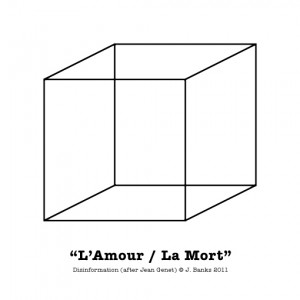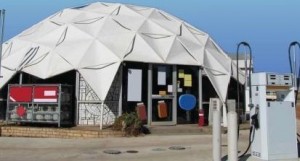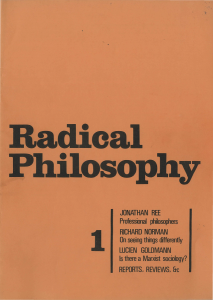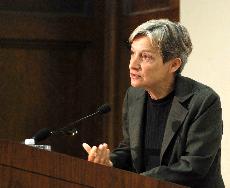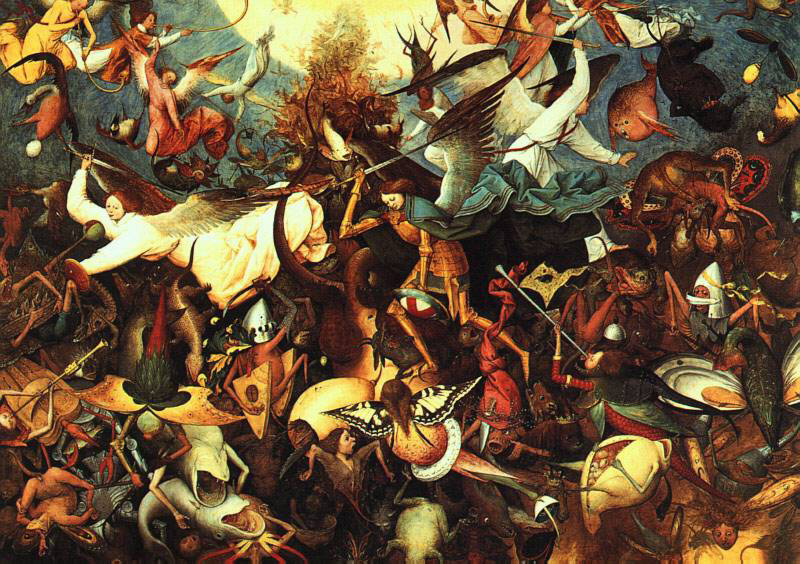-
Architecture
archive
art
Ballard
body
China
cinema
ecology
education
Europe
Ezra Pound
futurology
gothic
image
law
Literature
London
magic
memory
Modern
Modernism
museums
music
novel
performance
photography
poetry
politics
radical philosophy
science
science fiction
Sinclair
Situationism
sound art
Surrealism
technology
television
the avant-garde
The Future
Theory
thomson
time
Urban
visual culture
war
Posts tagged Theory
Ranciere review
Tagged as Literature, radical philosophy, Theory

David Cunningham’s review of Jacques Ranciere’s The Politics of Literature, published in the latest issue of Radical Philosophy, is currently up as a freebie on the website. You can read it here: http://www.radicalphilosophy.com/uncategorized/flaubert%e2%80%99s-parrot
Early warning: Joe Banks’ next Rorschach Audio lecture, Dec 7th
Tagged as art, sound art, technology, Theory
‘Rorschach Audio: Mysterious-devil-tale, Devil-bewitched-by-Death’
Wednesday 7 December 2011, 1.15pm – 2.45pm
Room 359, University of Westminster, 309 Regent Street, London W1B
Following on from the “Rorschach Audio” lecture demonstration presented to the IMCC in March 2011, and, in particular, that lecture’s discussions of Jean Cocteau, Salvador Dali, EH Gombrich, Primo Levi and Leonardo da Vinci, visual and sound artist Joe Banks presents further explorations of the influence of “Rorschach Audio” phenomena on contemporary literature and creative art. This presentation directly extends the material discussed in the previous lecture, so any guests not familiar with the earlier talk are encouraged to read the “Rorschach Audio” research publications available here…
http://muse.jhu.edu/journals/lmj/summary/v011/11.1banks.html
http://www.slashseconds.org/issues/002/004/articles/jbanks/index.php
RP in NY, October 21st 2011
Tagged as New York, politics, radical philosophy, Theory
Radical Philosophy Conference 2011
Columbia University, New York
Friday 21st October 2011, 9am – 7.30pm.
Radical Philosophy will be visiting New York for its 2011 conference, held in collaboration with Columbia University. The event is free but advance registration is essential: radicalphilosophyrsvp@gmail.com
Sessions:
Postcolonial Worlds ∙ Representing Capitalism ∙
Biocapital and Security ∙ Temporalities of Crisis ∙ Politics of Information ∙
Speakers:
Claudia Aradau; Souleymane Bachir Daigne; Tim Bewes; Antonia Birnbaum; Finn Brunton; Marilena Chaui; David Cunningham; Silvia Rivera Cusicanqui; David Golumbia; Harry Harootunian; Esther Leslie; Rosalind C. Morris; Mark Neocleous; Peter Osborne; Kristin Ross; Kaushik Sunder Rajan; Gayatri Chakravorty Spivak
Further details including conference programme and abstracts at:
http://www.radicalphilosophy.com/uncategorized/radical-philosophy-conference-2011
Register at: radicalphilosophyrsvp@gmail.com
Materialities of text online conference
Tagged as archive, Literature, technology, Theory

Materialities of Text: Between the Codex and the Net
An Online Conference, from October 24th – November 4th 2011.
Remit:
The book, in its traditional codex form, appears in transition from print media to digital media; a condition nevertheless complicated by its forms of survival, as indicated by the term ‘webpage’. Despite the epochal significance of the scroll, the codex, and the digital text, such material figures of inscription are necessarily hybrid; a hybridity that especially characterises the current historico-technical relation between print and digital media. Hybridity, of course, has been championed, for example, in postcolonial studies, as a figure of subversion, but it is also clear that hybrid text, as much as it is an object of possible democratisation within the digital public sphere, is also an object of intense capitalisation. Thus, the apparent waning of the hegemony of print is drawing questions of the politics of textual materialism into critical perception, and the need to interrogate the specificity of these materials, in their complex relations to the sensual form of paper and the ‘dispersed’ textuality of the digital medium. What, then, are the new materialities of hybrid text-media? What are the politics of digital/print hybrids, artists’ books, writing technologies, and digital publishing? How does media hybridity transform the political book, the artists’ book, or the work of literature? What effects do new materialities of text have on patterns of reading? Has media process replaced the media object? What are the sensory forms of new media materialities? How is the commodity-form of the book altered by new media platforms? What are the conditions and forms of specific media hybridities? What does new media do to the ‘perversions’ of the book – to bibliomania, to fetishism? Are we still ‘people of the book’ – what remains of the authority of the book? How has independent publishing responded to new materialities of text? What might figures of the book offer in the way of new or counter-knowledges, forms of community and communication?
Platform / Participants:
In keeping with its theme, the project will centre on an online conference, held on this website, which will allow the uploading of short texts and images, and user-generated commentary and debate. The organisers invite responses to texts and related questions from thinkers in all disciplines: literary-cultural studies, art-practice, critical theory and philosophy, book and publishing history and practice, etc.
Abstracts of included texts: Janneke Adema & Gary Hall (Coventry University): ‘(Im)materialities of Text: The Book as a Form of Political & Conceptual Resistance in Art and Academia’; Richard Burt (University of Florida): ‘Shelf-Life’; Johanna Drucker (UCLA): ‘Diagrammatic Writing’; Davin Heckman (Siena Heights University): ‘The Politics of Plasticity: Neoliberalism, Deliberation & the Digital Text’; Sas Mays (University of Westminster) ‘Mnemopolitics: Philosophy & the Archive in the Digital Public Sphere’; Daniel Selcer (Duquesne University): ‘Invisible Ink: Atomizing Textual Materialism’; Nick Thoburn (university of Manchester): ‘Materialities of Political Publishing’.
The organisers – Sas Mays (IMCC, Westminster) and Nick Thorburn (Manchester) – intend this forum to allow discussion that may be included within the second form of dissemination, and may feed into contributors’ articles within it: a special issue of the journal New Formations to be published in 2012.
A plug for the new website for Radical Philosophy. The address remains the same – http://www.radicalphilosophy.com – but as well as updating the way the website looks and works, every single item from the back catalogue has now been added to the online archive, from the first Radical Philosophy published in Spring 1972 through to the very latest issue.
Subscribers continue to have full access to and unlimited downloads from the archive, including all articles, interviews and reviews now available from RP1 to the present. Non-subscribing readers will enjoy free access all the commentaries, obituaries, conference and news reports, plus highlights from back issues and new access to hundreds of items from the expanded archive. A new feature of the website will also allow non-subscribers to purchase and download pdfs of individual items from the archive at an affordable price of £3 for any article or interview and £2 for the reviews sections from recent issues.
When the first issue of Radical Philosophy was published in January 1972, it sought – in the wake of the rise of the New Left and the student movements of the 1960s – to challenge the institutional divisions that it saw as contributing to the impoverishment of contemporary philosophical practice: divisions that existed between academic departments, between teachers and their students, and between the university and society. “Our main aim,” the Editorial Collective declared, “is to free ourselves from the restricting institutions and orthodoxies of the academic world, and thereby to encourage important philosophical work to develop: Let a Hundred Flowers Blossom!”. In the ensuing forty years much has changed about contemporary philosophy, in the UK and elsewhere. But as testified by recent dossiers on transdisciplinarity, campaign reports on the revitalized student movement, and regular philosophically-informed commentaries on contemporary social and political issues, those problematic disciplinary, pedagogical and social divisions continue to be challenged by those writing in Radical Philosophy.
To access the expanded archive, subscribe to the journal, check out selected content from the latest issue, or download the current free gift from the back catalogue – Jacques Rancière’s ‘On the Theory of Ideology’ (originally published in RP7, Spring 1974) – simply click here.
New Ways of Working with Image workshop, September 2011
Tagged as art, image, Theory, visual culture

‘New Ways of Working with Image’ Seminar and Workshop
Wednesday 14 September 2011
University of Westminster, 309 Regent Street, London
How do we understand ‘image’ today, and how has our notion of the image changed over time? What is the status of the image in current theory, and how does the study of image translate into visual culture? In which ways do words and verbal communication relate to or conflict with images? Do we work differently with images today, compared to the practices of previous generations? And if we do, why? Questions such as these underlie the Institute’s autumn Workshop which focuses on a practical, hands-on angle approach to working with image today.
Participants in this experiment are invited to discuss what they understand by the notion of ‘image’ and which methods they have chosen to work with it. Instead of discussing general themes and motifs without knowledge of each other’s premises, talking about what one does, and how one does it, reduces the chance of conceptual miscommunication and provides the opportunity for learning from new viewpoints. Interested academics, scholars and postgraduate students are all invited to attend.
The format of the day will be an interactive opening panel of invited speakers from art history, photographic theory, visual culture, philosophy and literary studies reflecting on their own approaches to the image in both disciplinary and transdisciplinary terms, followed by smaller group workshop sessions open to signed-up members of the audience, and concluding with general discussion. Individual workshop themes will include: (1) Image and Performance: on the nature and role of images in and as performance; (2) Imagescapes: what kinds of scenes and spaces images form and come to interact in; (3) Imaginary Image: how images condition and affect the reading experience; (4) Remediating Image: the slide and change of images between different semiotic modes.
Confirmed panel participants and workshop chairs include: David Cunningham (IMCC, Westminster), Mick Finch (Fine Art, Central Saint Martins), Andrew Fisher (Visual Culture, Goldsmiths College), Elena Gualtieri (Centre for Visual Fields, Sussex), Nigel Mapp (English Literature, Westminster), Lise Majgaard Mortensen (Aarhus University/IMCC), Luke Skrebowski (History of Art, Cambridge), Marquard Smith (IMCC, Westminster), Jarkko Toikanen (Tampere University/IMCC)
This workshop is convened by our Visiting Research Fellows in the Institute, Lise Majgaard Mortensen and Jarkko Toikkanen. For further information or to reserve a place (numbers are strictly limited!), please email Jarkko at: Jarkko.Toikkanen@uta.fi
Whitechapel Salon: Cultures of Capitalism I, May 12th
Tagged as capitalism, radical philosophy, Theory

Thursday 12 May 2011, 7pm
Whitechapel Gallery, 77-82 Whitechapel High Street, London E1
Price: £7.00 / £5.00 concessions (includes free glass of wine).
This season’s new Whitechapel Salon organised by the IMCC in collaboration with the Whitechapel Gallery will be on ‘Cultures of Capitalism’. In the first of four events interrogating contemporary economies of art and culture, Esther Leslie, author of Walter Benjamin: Overpowering Conformism, Adrian Rifkin, author of Street Noises, and David Cunningham, co-editor of Adorno and Literature, discuss ‘The Culture Industry Now’. Chaired by Marquard Smith.
Book your ticket at:
http://www.whitechapelgallery.org/shop/product/category_id/22/product_id/871
The intermedial experience of horror
Tagged as gothic, Literature, Theory

Wednesday 9 February 2011, 1.15-2.30pm
Room 106, University of Westminster, 32-38 Wells Street, London W1T 3UW
Jarkko Toikkanen (Visiting Research Fellow, IMCC)
“Suspended Failures: The Intermedial Experience of Horror”
Our new Visiting Research Fellow will be presenting a ‘promo’ for the research project on horror that he will be carrying out at the Institute this year. He has suggested that participants might like to read Robert Frost’s poem ‘The Fear’ in advance of the seminar. An online copy can be found at: http://www.bartleby.com/118/14.html
Further details on the English Literature and Culture research seminar series here.

Professor Allan Stoekl, ‘The Noir Auteur and De-Facement’
Friday 11th February 2011, 2-4pm
The Westminster Forum, University of Westminster, 5th Floor, 32-38 Wells Street, London W1T
Allan Stoekl is Professor of French and Comparative Literature at Pennsylvania State University. His many publications include the books Politics, Writing, Mutilation: The Cases of Bataille, Blanchot, Roussel, Leiris and Ponge (University of Minnesota Press, 1985); Agonies of the Intellectual: Commitment, Subjectivity, and the Performative in the Twentieth-Century French Tradition (University of Nebraska Press, 1992); and Bataille’s Peak: Energy, Religion, and Postsustainability (University of Minnesota Press, 2007). He was editor of a seminal special issue of Yale French Studies, ‘On Bataille’ (1990), and is translator of several texts by Bataille and Maurice Blanchot, as well as Paul Fournel’s Need for the Bike (2003). He is currently completing a book entitled Externalities, Retrofitting, Gleaning.
In this paper, Allan will provide a reading of the films Pépé le Moko (Duvivier, 1936) and Journal d’un curé de campagne (Bresson, 1950) from the perspective of film noir, reading the noir problematic via Paul de Man’s take on prosopopeia and offering a close reading of several scenes from the movies.
An Encounter with Judith Butler
Friday 4th of February
Fyvie Hall, University of Westminster, 309 Regent Street, London W1B
Organised by our friends in the Centre for the Study of Democracy, Judith Butler will be visiting Westminster in early February. Programme as follows.
10.20am – 1pm: Judith Butler’s contribution to contemporary ethical and political issues
with Isabell Lorey, Vikki Bell, Stewart Motha, Elena Loizidou
chaired by Chantal Mouffe
2pm – 4.30pm: Judith Butler’s contribution to gender theory
with Henrietta Moore, Mandy Merck, Leticia Sabsay, Terrell Carver
chaired by Harriet Evans
5pm: Public lecture by Judith Butler
“The Right to Appear. Towards an Arendtian Politics of the Street”
The event is free but places are limited. To reserve a place contact: Jessica.Schmidt@my.westminster.ac.uk

Our colleagues on the MA Photography Studies in the School of Media, Art and Design, based in Harrow, have organized an excellent Open Photography Lecture Series on Wednesdays this semester. They are free, but please arrive early since places are limited.
29 Sept, 2pm Karen Knorr, Guest Photographer/Artist Talk
Lecture Theatre 2
6 Oct., 6pm Kobena Mercer, ‘Questioning the Cross-Cultural in Contemporary Art’
Lecture Theatre One (LT1)
13 Oct, 6pm Victor Burgin, ‘A Place to Read-a recent projection work for Istanbul’
Lecture Theatre One (LT1)
20 Oct, 6pm Michael Newman, ‘John Stezaker and the Image’
Lecture Theatre One (LT1)
27 Oct, 6pm Renata Salecl, ‘Identification in times of uncertainty’
Lecture Theatre One (LT1)
24 Nov, 1pm Paul Seawright, Guest Documentary Photographer/Artist Talk
Room TBC
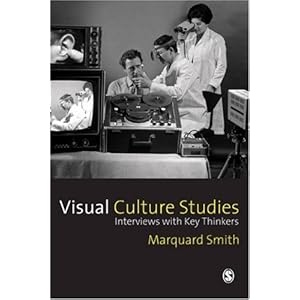
In the interests of Open Access, we are very pleased to attach Visual Culture Studies: Interviews with Key Thinkers (Sage, 2008), a PDF of the IMCC Director Marq Smith’s book of interviews with Mieke Bal, Giuliana Bruno, Mark Cheetham, Michael Ann Holly and Keith Moxey, Susan Buck-Morss, Lisa Cartwright, Lennard J. Davis, Hal Foster, Paul Gilroy, Martin Jay, Nicholas Mirzoeff, W.J.T. Mitchell, Peggy Phelan, and Vivian Sobchack. Enjoy, and feel free to circulate.
The Hole in Time: Full Programme
Tagged as archive, radical philosophy, Theory, time

The Hole in Time: German-Jewish Political Philosophy and the Archive
Date: Wednesday 23rd June – Thursday 24th June 2010, 9.30-6.00
Venue: Portland Hall, University of Westminster, 4-16 Little Titchfield Street, London W1W 7UW
Admission is free, but, since places are limited, please contact the organisers to book a place by the 17th of June at theholeintime@live.com
Wednesday 23rd of June
9.30 – 10.00 Introduction: Sas Mays (Westminster), Leena Petersen (Sussex)
10.00 – 12.00 Panel 1: Modern Crisis and the History of the Present – Part 1
Nicholas Lambrianou (Birkbeck): ‘Figures of Interruption: Philosophical Dramas of Temporality and History in Benjamin and Rosenzweig’
Sami Khatib (FU Berlin): ‘The Messianic and the Archive: Walter Benjamin’s “Politics of Time”’
Leena Petersen (Sussex): ‘Messianic Libertarianism and Linguistic Philosophies of History in Benjamin and Related Writings of His Time’
Chair: Christian Wiese (Sussex)
1.00 – 3.00 Panel 2: Poetics of Temporality
Howard Caygill (Goldsmiths): ‘Paul Celan’s Visual Archive’
Nitzan Lebovic (Tel Aviv / Sussex): ‘Paul Celan: Language of Loss at the Heart of Time’
Shela Sheikh (Goldsmiths): ‘The Wounded Archive: Derrida Reading Celan’
Chair: Keston Sutherland (Sussex)
3.30 – 5.30 Panel 3: The Temporality of Archives – Part 1
Elina Staikou (Goldsmiths): ‘Vigil of the Archive: On Derrida Dreaming Benjamin’
Rebecca Dolgoy (Montreal / FU Berlin): ‘The Work of Art as Archive: Examining Adorno’s Zeitkern as Time Capsule’
Tommaso Speccher (FU Berlin): ‘The Hole in Space: Fragmenting and Re-piecing the Archive between Walter Benjamin and Daniel Libeskind’
Chair: John Roberts (Wolverhampton)
Thursday 24th of June
10.00 – 12.00 Panel 4: Modern Crisis and the History of the Present – Part 2
Reut Paz (Humboldt University Berlin): ‘The Legal Transcendentalism of Hans Kelsen as a Hole in Time’
Birte Loeschenkohl (Frankfurt): ‘Kairos: The Right and Opportune Moment as a Caesura in and of Time’
Veronika Koever (Queen Mary): ‘Reversing the Irreversible: Jean Améry’s “ressentiments” and the Moralisation of Time’
Chair: Leena Petersen (Sussex)
1.00 – 3.00 Panel 5: The External Archive
Andy Fisher (Goldsmiths): ‘”Quiet Life”: History, Pathos and the Archive in Ernst Friedrich’s Kriege dem Krieg’
Manu Luksch (London): ‘Moonwalking in Real Time’
Chair: Esther Leslie (Birkbeck)
3.30 – 5.30 Panel 6: The Temporality of Archives – Part 2
David Cunningham (Westminster): ‘Abstract Times: Benjamin, Kafka and the Modernism of Tradition’
Matthew Charles (Middlesex): ‘The Snow Line of the Archive: Walter Benjamin On the Trail of Old Letters’
Andrew McGettigan (Central Saint Martins College of Art & Design, London): ‘The Archive and the Idea: Walter Benjamin’s Experiences of Time’
Chair: Nitzan Lebovic (Tel Aviv/Sussex)
Organised by Sas Mays (Westminster), and Leena Petersen and Nitzan Leibovic (Sussex), as part of the research project ‘Archiving Cultures’ at the IMCC.
Hole in Time workshop: speakers announced
Tagged as Europe, radical philosophy, Theory, time

The Hole in Time: German-Jewish Political Philosophy and the Archive
Date: Wednesday 23rd June – Thursday 24th June 2010, 9.30-6.00
Venue: Portland Hall, University of Westminster, 4-16 Little Titchfield Street, London W1W 7UW
Left discussions of politics and history owe much to German-Jewish theories of temporality that emerged in response to the political crises of twentieth-century Europe; such theories helped to problematize both the life of the individual and how the state perceived it. The workshop ‘German-Jewish Political Philosophy and the Archive’ brings together interested parties to engage with the data collection and archival dimensions of German-Jewish conceptions of temporality, history and crisis, as well as the German-French dialogue in critical philosophy.
Speakers: Howard Caygill (Goldsmiths, London); Matthew Charles (Middlesex); David Cunningham (IMCC, Westminster); Rebecca Dolgoy (Montreal/ FU Berlin); Andrew Fisher (Goldsmiths, London); Sami Khatib (FU Berlin); Veronika Koever (Queen Mary, London); Nicholas Lambrianou (Birkbeck, London); Nitzan Lebovic (Tel Aviv/Sussex); Birte Loeschenkohl (Frankfurt); Manu Luksch (London); Andrew McGettigan (University of the Arts, London); Reut Yael Paz (RishonLeZion); Silvia Richter (Heidelberg); Shela Sheikh (Goldsmiths, London); Tommaso Speccher (FU Berlin); Elina Staikou (Goldsmiths, London)
Chairs: Paul Betts, Christian Wiese, Esther Leslie, Sas Mays, Leena Petersen, Keston Sutherland
Co-organised by the IMCC and Centre for German-Jewish Studies, University of Sussex
Wednesday 24th February, 1.15-2.30pm
Room 106, University of Westminster, 32-38 Wells Street, W1T 3UW
Nigel Mapp (University of Tampere, Finland)
‘Milton, Life, Heresy’
Free to all.
Public Lecture: Toby Miller
Tagged as education, television, Theory, visual culture
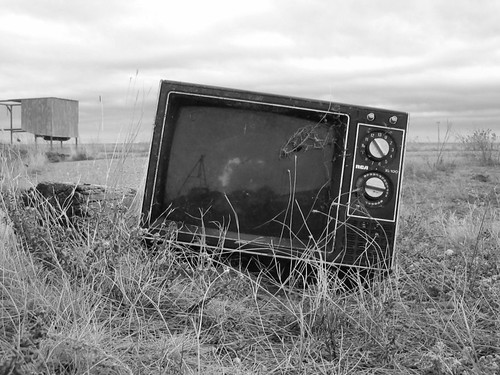
Wednesday January 13th 2010, 5.00pm
Cayley Room (room 152), University of Westminster, 309 Regent Street
Professor Toby Miller (University of California, Riverside)
“Cultural Policy Redux”
Toby Miller is editor of the journal Television & New Media, and author of many books including Spyscreen (Oxford University Press), Television (Routledge), Television Studies (BFI), Popular Culture and Everyday Life (Sage), Technologies of Truth (University of Minnesota Press), The Avengers (BFI), and The Well Tempered Citizen (The Johns Hopkins University Press).

Friday 15 January 2010, 10am-4.30pm with public lecture at 5pm
Fyvie Hall, University of Westminster, 309 Regent Street
Our next door neighbours in the Centre for the Study of Democracy (CSD) are hosting their annual CSD Encounter on Friday 15th January 2010. Following recent encounters with Julia Kristeva and Stuart Hall, this year’s one-day event will be focused on the work of Charles Taylor, with two workshop sessions followed by a public lecture by Professor Taylor himself on ‘Secularism and Multiculturalism’. Workshop speakers include Grace Davie, Steven Lukes, Tariq Modood, Chantal Mouffe and Stephen Mulhall.
For further information and to RSVP email: Jessica.schmidt@my.westminster.ac.uk

The second part in a short selection of transcriptions of talks from the recent series on ‘The Future’ at the David Roberts Art Foundation. Here’s Garin Dowd’s paper from the final night, seamlessly drifiting from Beckett to Ballard, Deleuze to Daney.
3. ‘Replay: conducts of time x 4 (interstitial pedagogies)’
Garin Dowd
I borrow the idea of conducts of time from Eric Alliez. Conducts would refer to behaviours – and suggest an ethology – but also to channels. Conducts of time are also ‘gaits’ of time, postures of time in movement; equally they might inhere in the pas au-delà, the step which is also a pas – a not, in Jacques Derrida’s formulation (via Blanchot). Conducts of time may give rise to systole or diastole, to condensations and saturations, as in running on the spot, and to disseminations. It may produce reifications and consolidations, or it may liberate blocs of becoming.
The action of Samuel Beckett’s play Krapp’s Last Tape is famously set, according to the stage directions, on ‘a late evening in the future’. While it is anecdotally recorded that the motivation behind this direction was Beckett’s concern that, without such a prompt, what would be required of the audience is the performance of the retrospective science fiction to permit tape recorders to exist prior to their invention (the aged Krapp listens to a recording of himself aged 39, while the play was first staged in 1958), there seems to be much more at play than simply a peculiar concession to verisimilitude. Nonetheless the precession, at once announced and elided by Krapp’s Last Tape, of this particular archival technology, reminds one also that it is the cataloguer of the famous precession of simulacra, Jean Baudrillard, who tells us much, inadvertently, about Beckett’s concerns in this play. In La Gauche Divine we read that ‘le rêve d’une conductibilité absolue [de l’information] ne peut etre qu’excrémentiel’: the dream of an absolute conductibility [of information] can only be excremental. The dream of an absolute conductibility of information is also the predicament or the opportunity of the protagonist in Krapp’s Last Tape. How to phrase; how to gather; how to memorialise ‘eschatologically’ (his last tape) and/or scatalogically (his ‘unattainable laxation’): these issues trouble Krapp, and trouble him in a way which is, in Derrida’s sense, archival. In this respect the play reminds us of what Derrida identifies as the archive’s relationship to the future: ‘the technical structure of the archiving archive also determines the structure of the archivable content even in its very coming into existence and in its relationship to the future’. So on our particular late evening in the future, the future now or round about now, I want to introduce 4 conducts of time.
Call for Papers: Temporality and the Archive
Tagged as archive, Theory, time

The Hole in Time: German-Jewish Political Philosophy and the Archive.
A call for papers for a workshop organised by the Centre for German Jewish Studies at Sussex and the Institute for Modern and Contemporary Culture at Westminster
23rd – 24th June 2010
Abstracts by the end of January 2010 to: theholeintime@live.com
Left discussions of politics and history owe much to German-Jewish theories of temporality that emerged in response to the political crises of twentieth-century Europe; yet, other than in the attention paid to issues of technological memory in Benjamin, there has been relatively little discussion of the archival ramifications of, for example, Adorno, Bloch, Celan, Rosenzweig, and Simmel, as well as other canonical Marxist thinkers. While Benjamin’s thought has often been mobilised to think the revolutionary potential of the archive, less has been done to think through the archival attitudes and implications of the work of such other thinkers, or the extent to which such attitudes are specifically predicated upon German and Jewish philosophical and political tradition. Continue reading Call for Papers: Temporality and the Archive
The Whitechapel Salon: “Hope” with Professor Peter Osborne
Thursday 7th January, 7pm
Study Studio, Whitechapel Gallery, London E1 7QX
Following on from discussions with Gayatri Spivak, Chantal Mouffe and Richard Sennett, in the final session of the current series of Whitechapel Salon events on the theme of ‘hope’ Peter Osborne, author of The Politics of Time (1995), Philosophy in Cultural Theory (2000) and Conceptual Art (2002), and Director of the Centre for Research in Modern European Philosophy at Middlesex University, will be in discussion with his fellow editor at Radical Philosophy, and Deputy Director of the Institute, David Cunningham.
Book now to avoid disappointment! You can do so here.
Tickets: £7/£5


The Institute for Modern and Contemporary Culture
University of Westminster Department of English, Linguistics and Cultural Studies
32-38 Wells Street, London W1T 3UW. United Kingdom.

